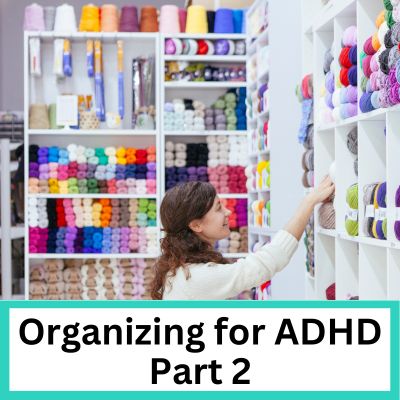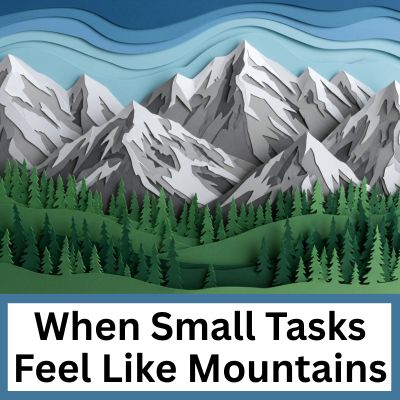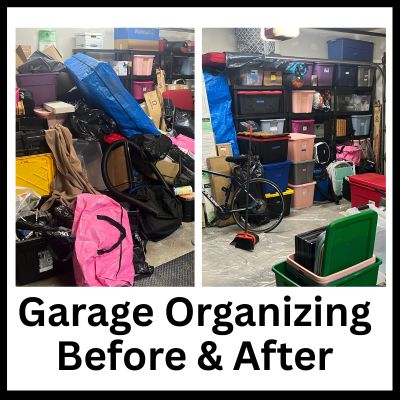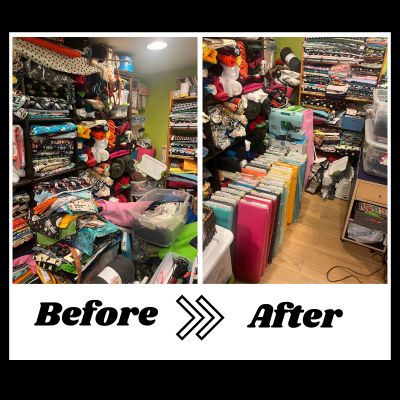Organizing for ADHD Part 2

In my last post about ADHD, I talked about some health tips that I’ve found helpful to manage ADHD. Many people with ADHD also have a lot of difficulty with getting things organized and then keeping them organized. Being disorganized can exacerbate feelings of overwhelm and low self-esteem, feelings that are commonly experience by people with ADHD. In this post, I’ll talk about how organizing for ADHD is different than conventional organizing.
Conventional Organizing
You’ll often see images of this type of organizing in magazines. Picture clear countertops, cabinets with closed doors, and drawers without labels. People who don’t have ADHD (or other neurodiversity or brain-based condition) can often remember where they stored things even when they’re out-of-sight. They don’t need labels to help them remember where things belong, but they might like to use labels for aesthetic reasons. They can manage their time and energy so that stuff doesn’t get shoved in closets or in drawers never to be seen again. Or if they do have to shove something in a drawer, they have an internal alarm to remember to go through their stuff on a regular basis. They don’t need to leave things on countertops to remember to do them, or if they do, the things get done in a timely manner and don’t build up. They habitually clear their desk or workspace off at the end of the day because having a clear workspace is so ingrained into how they operate. Things may get messy or look out-of-control at times, but they can wrangle their clutter before it piles up too high.
When I help someone with conventional organizing needs, we may work on any or all stages of the organizing process: sorting, decluttering, figuring out storage solutions, picking out containers, or talking about how to maintain the space. The process has a more linear progression.
Similarities Between Conventional and ADHD Organizing
-Sorting like with like.
-Picking out the best storage system.
-Picking out the best storage containers.
-Rearranging the furniture or layout of a room to be the most efficient use of space.
-Both groups may or may not have a strong attachment to things.
Organizing for ADHD
As much as people with ADHD may aspire to be like their neurotypical peers with clean countertops, perfectly organized cabinets, and storing everything out of sight, it’s not always the most practical goal. Instead, it’s better to work with their natural gifts and talents, rather than trying to be someone that they’re not. With that said, it may still be important to learn habits to get organized and stay organized.
Just as I help people who need conventional organizing with all stages of the process: sorting, purging, creating storage systems, and maintaining, the process is far less linear. I may need to break down organizing principles such as defining what kinds of things go in each category, and I need to be more creative about how things are stored so that the storage systems we choose will be realistic for retrieving items and putting things away.
Another important component to take into account is the emotional one. People with ADHD have often experienced a lot of shame for their organizing skills. They can be overwhelmed by the state of their home and embarrassed to have people over. They may have been ridiculed by people in their life for their disorganization and may have deep internal beliefs about their identity as someone who can’t get organized. As we work together, I help untangle these limiting beliefs so that they can start to see themselves as someone who is capable of being organized.
Here are some other ways ADHD organizing is different than conventional organizing:
- Instead of “trying harder” to maintain systems that aren’t designed for an ADHD brain, I love to help people “try differently”. This involves understanding what supports you personally need to help you get organized. If you’re someone who needs a body-double (someone else with you) to make progress organizing, instead of continuing to try harder to get things done on your own, find someone who can act as a body-double. People with ADHD have often tried very hard, but will have less results than people who don’t have ADHD. If you find yourself continuing to try to do something and failing, but you can’t figure out what you need to do differently, I can help you different strategies to implement. While the concept of “trying harder” is totally necessary for some things and will help some people reach their goals, there is a point of diminishing return where trying harder will result in burnout and nothing will get done. The concept of “just try harder” is definitely something I’m sensitive to, because for years I was told to just try harder with reading. My eyes would go over the words in a paragraph and I could see them, but it’s like they wouldn’t enter my brain. I would have to re-read and often read out-loud to have some hope of absorbing some of the information. Once I made necessary modifications to my diet, and started taking ADHD medication and/or supplements, I could actually finish books and tell you what they were about!
- Trying to maintain too much “inventory” is inherently difficult. Streamline your stuff. This usually involves decluttering years of abandoned projects, metaphorical/literal “old news”, and out-of-date items. Once the good stuff has been unearthed and separated from what’s no longer important, we can create ADHD friendly homes for things. Although people who need conventional organizing help may need to declutter, people with ADHD often have the need to keep more stuff handy due to their variety of interests and hobbies.
- The discussion of what’s no longer important can be a challenge for people who see potential in everything- especially people who love to craft. I totally get it! It’s important for someone with ADHD to work with an organizer who has compassion and patience so that trust is established. Without a sense of trust, someone with ADHD is more likely to cling to belongings, even if they know they will never use them. A good organizer will help their clients tune in to their intuition so they can make decisions on their own and trust their choices.
- What are ADHD friendly homes? The answer is uniquely suited for each individual, depending on their learning style and work habits. There can be a series of trial and error attempts, but often the system that ends up working will have open storage, clear containers, and labels that are easy to use. For deep cabinets, Shelf Genie pull-out shelves are an excellent solution to access the back of the cabinet. More out-of-the box solutions may include a filing system made from gallon sized Ziplock bags on a clothesline, or a clothing storage solution that utilizes hooks or open containers.
- More about labels: keep a roll of 1” blue masking tape and a Sharpie around so that you can quickly label boxes, drawers, bins, or anything else. These types of labels are often temporary, but can stay on for years. They are easy to switch and change as your storage needs shift. Once you feel like things are dialed in, use a label maker or Cricut to make fancier labels. Although some people may feel like they’re living in a kindergarten with all the labels around, I encourage you to let that stigma go. The functionality of labels greatly outweighs not being able to find your stuff!
- Keep storage systems SIMPLE! Subcategorizing too granularly will create frustration and will be hard to maintain. No matter if you’re organizing paper, pantry items, toiletries, office supplies, or whatever you’re doing- only organize things as much as you have to so that you can find what you need.
- If you’re someone who likes to have physical to-do lists or piles of paper on horizontal surfaces so that you can find what you’re looking for, make sure that you’re working with an organizer who can help you improve upon your systems rather than completely change your ways. Work with someone who sees your strengths and builds on what IS working for you.
- Hire an organizer who can follow divergent thinking. People with ADHD often have a whole bunch of ideas and thoughts that seem unrelated, but may very well be connected. People in their lives who do not understand this may shame them for getting off topic or changing the subject so much. A really good ADHD organizer will be able to follow the entire chain of thoughts, or will know when to gracefully call for a pause, to keep the session on track.
- “Done is better than perfect”. Learn to adjust expectations for yourself so that you can build upon habits rather than think you “should” get it perfect all the time. For example, if you’re someone with clothes all over the floor, some clean and some dirty, instead of trying to commit to folding like Marie Kondo “once and for all”, aim to get your clean clothes put away close to where the need to go. If you can’t manage to get your clothes hung up in the closet, shoot to just get it thrown over the hanging rod. If you can’t manage to get your clothes folded neatly, see if you can at least get them into a drawer. Once you’ve done that successfully on a regular basis, then up your goal to getting the clothes into the correct drawer.
- Give yourself lots of positive reinforcement for the organizing attempts you have done. For some people, just taking the recycling out once a week might be a major accomplishment. Meet yourself where you’re at instead of constantly thinking you need to work harder. Practicing this type of self-love and self-acceptance will be majorly motivating once you start recognizing yourself for your effort.
- An organizing maintenance plan for someone with ADHD will take into account how the individual likes to organize their time, how specific they like to make their to-do’s, and how frequently they want to pick up after themselves. For some people, organizing too often will kill their flow, and they prefer to do it less frequently. Other people may need to spruce things up on a daily basis so that they can think straight. Implementing the use of a timer rather than asking someone to commit to organizing a whole room will often help make sure the chore gets done. Knowing they only have to do something for a finite amount of time will make it easier to get started than thinking they have to do some huge task.
If you have ADHD, what unique ADHD friendly organizing tips have helped you?

Posted By Jean Prominski, Certified Professional Organizer
- Follow me on Instagram @seattlesparkle
- Join my Facebook Group, Declutter and Organize with Seattle Sparkle.
- Ready to book a consultation? Complete this form.
- Download my free 5 week journal The Seattle Sparkle Method to Get Organized and Stay Organized
- Check out my media exposure: Seattle Sparkle in the Media
- For artwork to energize your home, order through jeanprominski.com.




